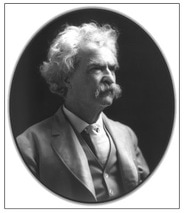
"We picked up one excellent word — a word worth travelling to New Orleans to get; a nice limber, expressive, handy word — "lagniappe." They pronounce it lanny-yap. It is Spanish — so they said. We discovered it at the head of a column of odds and ends in the Picayune, the first day; heard twenty people use it the second; inquired what it meant the third; adopted it and got facility in swinging it the fourth. It has a restricted meaning, but I think the people spread it out a little when they choose. It is the equivalent of the thirteenth roll in a "baker's dozen." It is something thrown in, gratis, for good measure. The custom originated in the Spanish quarter of the city. When a child or a servant buys something in a shop — or even the mayor or the governor, for aught I know — he finishes the operation by saying — "Give me something for lagniappe."
The shopman always responds; gives the child a bit of licorice-root, gives the servant a cheap cigar or a spool of thread, gives the governor — I don't know what he gives the governor; support, likely.
When you are invited to drink, and this does occur now and then in New Orleans — and you say, "What, again? — no, I've had enough;" the other party says, "But just this one time more — this is for lagniappe." When the beau perceives that he is stacking his compliments a trifle too high, and sees by the young lady's countenance that the edifice would have been better with the top compliment left off, he puts his "I beg pardon — no harm intended," into the briefer form of "Oh, that's for lagniappe."
Life on the Mississippi
Mark Twain
******************************************************************
The shopman always responds; gives the child a bit of licorice-root, gives the servant a cheap cigar or a spool of thread, gives the governor — I don't know what he gives the governor; support, likely.
When you are invited to drink, and this does occur now and then in New Orleans — and you say, "What, again? — no, I've had enough;" the other party says, "But just this one time more — this is for lagniappe." When the beau perceives that he is stacking his compliments a trifle too high, and sees by the young lady's countenance that the edifice would have been better with the top compliment left off, he puts his "I beg pardon — no harm intended," into the briefer form of "Oh, that's for lagniappe."
Life on the Mississippi
Mark Twain
******************************************************************
******************************************************************


